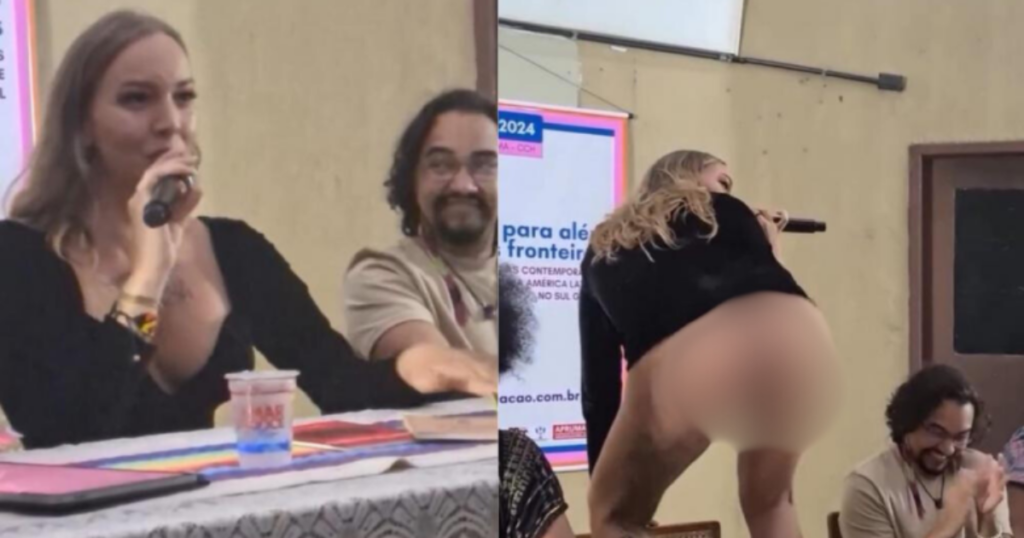In a controversial event at the Federal University of Maranhão in Brazil, a transgender individual named Tertuliana Lustosa caused a significant uproar by exposing her buttocks during a lecture that focused on “Gender and Sexuality Dissidence.” The incident occurred while Lustosa performed explicit, provocative lyrics from a song that she sang while standing on a chair, which included graphic references to sexual acts and a blatant disregard for conventional academic decorum. The moment was captured on video and soon went viral, igniting a fierce backlash from various segments of society, particularly among lawmakers and conservative groups.
During the panel discussion, which was hosted by a research group within the university, Lustosa’s performance was not only accepted but applauded by several professors and students present at the event. This reaction raised serious questions about the appropriateness of the academic environment, leading critics to argue that such performances promote indecency under the guise of educational discourse. The lyrics of the song, as reported, were perceived as particularly disgraceful and reductive, with references to sexual acts that many found offensive, especially in a collegiate setting meant for critical dialogue about complex social issues.
The incident drew the ire of multiple lawmakers, prompting them to call for accountability regarding the event’s organization and content. Politicians expressed their outrage over what they viewed as exploitation of public funding in a space that should uphold educational integrity. Nikolas Ferreira, Chairman of the House Education Committee, has formally requested an investigation into the performance, hinting at possible legal violations and suggesting that the professors involved may deserve termination from their positions. His efforts underscore a larger movement among conservative figures to challenge perceived excesses associated with progressive ideologies in educational contexts.
Furthermore, Ferreira raised alarms about the presence of minors at the event, emphasizing that such content is wholly inappropriate for educational environments financed by taxpayer money. This aspect of the debate highlighted concerns over the influence of leftist and “woke” agendas in public institutions, with many arguing that events like these display a troubling normalization of explicit content in academic settings. Lawmakers from various sides of the political spectrum echoed these sentiments, calling for stricter oversight and accountability measures within educational institutions.
Responding to the incident, Congressman Paulo Bilynskyj submitted a request for Education Minister Camilo Santana to testify before the National Congress to determine the extent and legality of public funding used for the event. Bilynskyj’s call reflects a widespread belief among critics that there should be consequences for what they consider the degradation of educational standards in favor of avant-garde expressiveness that ignores community standards. The responses from both sides of the political aisle demonstrate a growing polarization regarding cultural discussions in Brazil, particularly as they relate to issues of gender and sexuality.
Ultimately, the performance by Tertuliana Lustosa acts as a flashpoint in a larger dialogue regarding the boundaries of expression in academic contexts. Critics assert that the actions at the Federal University of Maranhão reflect a dangerous trend of prioritizing sensationalism over educational value. While supporters of such expressions might argue for free speech and artistic liberty, the backlash indicates a significant pushback from those who believe that educational institutions should serve as bastions of order and propriety rather than arenas for provocative performances. As this controversy unfolds, it raises fundamental questions about the role of public education and the intersection of politics, art, and gender in contemporary Brazilian society.

